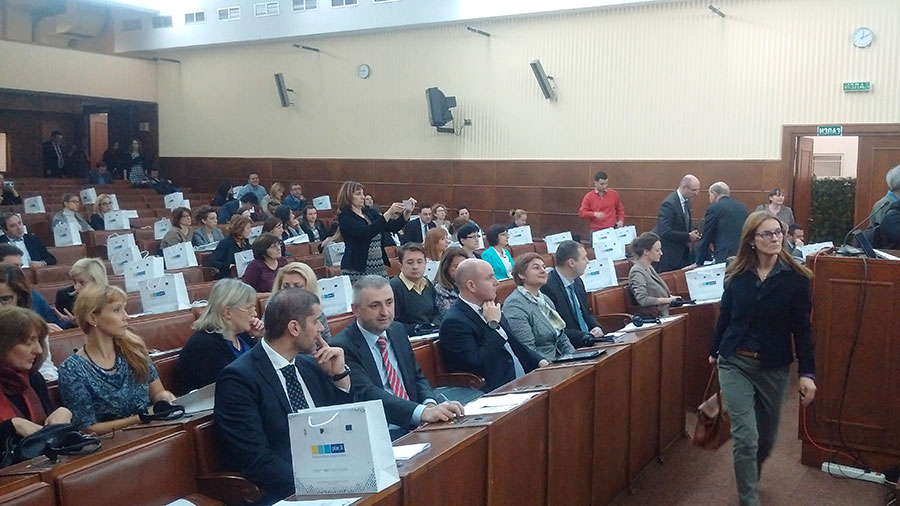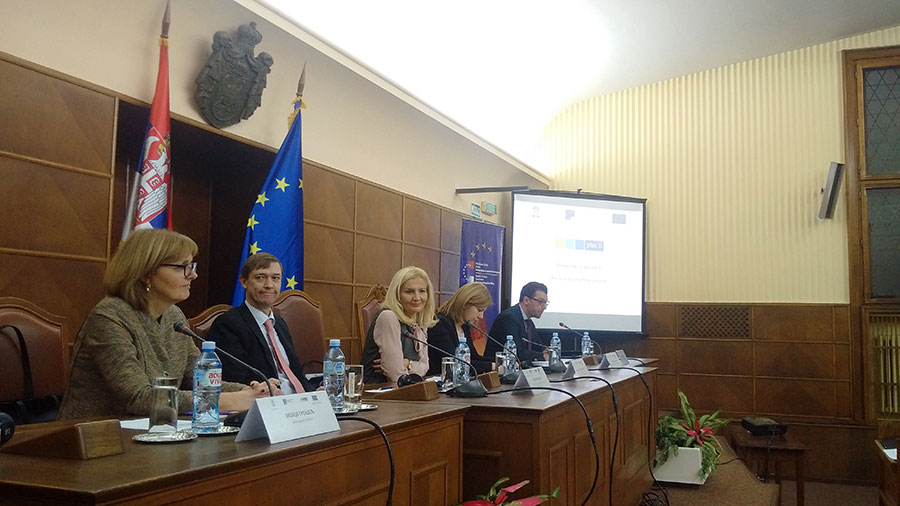The Legal Support for Negotiations project (PLAC II) was presented in the National Assembly in Belgrade to potential beneficiaries, such as members of working groups dealing with specific chapters. The project runs from 30 June through the end of 2018 and is worth EUR 2.6 million which will be primarily spent on experts working hours who will help Serbia to harmonise regulations with the EU, prepare compliance plans and build capacity to draft and enforce legislation.
Oskar Benedikt, Deputy Head of the EU Delegation to Serbia, said that the implementation period of the PLAC project was of key significance for Serbia’s European integration process due to the fact that four chapters had been opened and that the process was expected to pick up speed.
He said that the PLAC project might not be “visible” to the general public, but was essential for the “machinery” working to bring the country closer to the EU.
Support to harmonisation with EU acquis
PLAC II, worth EUR2.6 million, will help Serbia to align regulations with the EU acquis until the end of 2018, in line with the time frame set by the Government of the Republic of Serbia, said Ksenija Milenkovic, the Acting Director of the European Integration Office. The time frame, as she pointed out, should not be confused with the possible date of accession, which depended on circumstances and policies.
As stated at the meeting, the project covered areas in which Serbia lacked sufficient bilateral assistance from Member States or other any other form of cooperation.
Milenkovic said that the PLAC project (PLAC II) supported the basic activity of European integration − the adoption and implementation of European regulation.

“In our country, EU integration is frequently perceived as a political process, which is true, and a decision about the opening or provisional closure of negotiations or even one day a decision about the membership, is a political one, even if it concerns technical chapters, but behind all those decisions is a huge amount of work done by all institutions involved in adaptation of regulations to the EU acquis,” she said.
Milenkovic reminded that the Second Revised National Programme for the Adoption of the Acquis was adopted on 17 November, and that the document stipulated that all regulations should be aligned with the EU acquis by the end of 2018, noting that this goal should not be confused with a possible date of accession to the EU.
This moment is, therefore, a great one to start the PLAC project “as it provides an opportunity to plan our activities in line with the new harmonisation plan,” she said.
The projects provides the necessary flexibility
Tanja Miscevic, the Head of the Negotiating Team for Accession of the Republic of Serbia to the European Union, said that flexibility was the key feature of this project as it allowed to receive assistance in the preparation of regulation and accession documents in areas that unexpectedly come into focus.
As a concrete example, she cited chapter 13 dealing with fisheries, which “suddenly became significant,” and according to her, it turned out that the project helps Serbia to respond quickly to requests in such circumstances.
She reminded that Serbia already benefited from PLAC projects, since the talks on the Stabilisation and Association Agreement, adding that this was the second PLAC project since the opening of the accession negotiations.
“PLAC 2 launched today, aims to help us understand not only how to write negotiating positions and action plans, but also what they bring us,” she said.
This is the second PLAC project since the opening of EU accession negotiations and the second IPA-funded. The project aims at improving compliance of national legislation with the EU acquis and implementation of regulations and at enhancing institutions’ capacity to conduct negotiations.
Legal support for negotiations
Mojca Groselj, Team leader of the Legal Support for Negotiations project said that the project, worth EUR 2.6 million, was launched on 30 June 2016 and would run through the end of 2018.
Compared to the previous versions of the PLAC project, the logo and the project’s title in Serbian have changed. The project, she said, is now titled Legal Support for Negotiations (Pravna podrška pregovorima) in order to reflect the essence of the project, namely its main activity.
She listed the chapters the project will mostly deal with: 3 − Freedom of establishment and freedom to provide services, 4 − Free movement of capital, 6 − Company law, 9 – Financial services, 11 − Agriculture and rural development, 12 −Food safety, veterinary and phytosanitary policy, 15 − Energy, 24 −Justice, freedom and security, 27 − Environment and 28 − Consumer and health protection.
According to her, it will be possible to include other areas if necessary.




